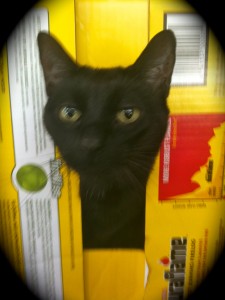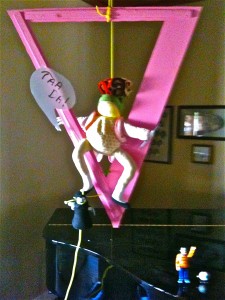
Ever since my husband installed a Vocobox â„¢ in our cat in a failed experiment, he (the cat, not my husband) stands outside the closed bedroom door in the mornings, calling. The intelligence update was partially successful, but the only word the cat has learned is its own name, Raven, which he uses to convey everything. I hear him when I wake up, the sound muted by the wooden door between us.
“Raven. Raven. Raven.”
Beside me, Lloyd murmurs something and turns over, tugging the sheet away, the cold whispering me further awake. When I go out to feed the cat, his voice lowers as he twines around my ankles, words lapsing into purrs. He butts against my legs with an insistent anxiousness, waiting for the dish to be filled. “Raven. Raven.” Kibble poured, I move to make our own breakfast, turning on the coffee maker and listening to its preparatory burble.
“I don’t know what I expected,” my husband mutters as he drinks his coffee in hasty gulps. “That cat was never very smart for a cat.” He glares at Raven as though blaming him for the failures of the world at large. The Vocobox is his own invention; his company hopes to market it this fall, and a promotion may hinge upon it. The last laurels my husband won are wearing thin; if the Vocobox is a success, he’ll be able to rest a while longer..
But when he first proposed installing it in the cat, he didn’t say it was still experimental. “The kids are gone, and you need some company,” he’d said. “The cat loves you best anyhow; now you can talk to him, and he’ll talk back.” He gave me a slight smirk and an eyebrow curve that implied that without him I’d be a dotty old cat lady, living in a studio apartment that smelled of pee and old newspapers.
“I’ll be late again tonight,” he tells me now. “And when I’m concentrating, I’ve found leaving my cell off helps. If you need something, just leave a message. Or call the service, that’s what we pay them for.” He’s out the front door before I can reply.
Every morning seems the same nowadays. My husband’s heels, exiting. The immaculate lawn outside. On Thursdays, the housekeeping service remotely activates the grass cutting robot. I see it out there, sweeping through the fresh spring grass that never grows high enough to hide it. A plastic sheep, six inches tall, sits atop its round metal case, someone’s idea of creative marketing. But the robot is done within the hour and then things are the same again. Back in the box.
I go into the living room, activate the wall viewer, and lose myself in reality television, where everyone has eventful lives. Soon Raven curls up on my lap. “Raven,” he murmurs, and begins to purr.
The mouths of the people on the screen move, but the words that come out are meaningless, so I hit the mute button. Now the figures collide and dance on the screen; every life is more interesting than my own.
At noon, I push the cat off my lap and have a sandwich; at dinner time a hot meal appears in the oven. I take it out myself, pour a glass of Chardonnay, take the bottle to the table with me. When did I become this boring person? At college, I studied music, was going to sing opera. I sang in a few productions, fell in love, became a trophy wife, and produced two perfect trophy children who are out there now, perpetuating the cycle. All those voice lessons wasted.
On the EBay channel that night I look for a hobby. There’s knitting, gardening, glass-blowing, quilling”¦ too many to choose from. I remember quilling from my daughter’s Bluebird days. We curled bits of paper, glued them down in decorative patterns on tiny wooden boxes. What was the point? I drink a little more wine before I go to sleep.
When he comes to bed, my husband snuggles up, strokes my arm. He murmurs something inaudible, the tone conveying affection. This only happens when he feels guilty. From the recently showered smell of him, I know what he feels guilty about. This must be an assistant I haven’t met yet.
When I don’t speak, he says “What’s the matter, cat got your voice box?” He chortles to himself at his clever joke before he lapses into sleep, not pursuing my silence. Out in the living room, I hear the cat wandering. “Raven.”
“You’re like a cliché,” my husband says at breakfast. “Desperate housewife. Can’t you find something to do?”
The cat’s attention swivels between us, his green eyes wide and pellucid with curiosity. “Raven?” he says in an interrogative tone.
I watch my husband’s heels, the door closing behind them, the deliberately good-humored but loud click, once again.
“Raven,” the cat says as it looks up at me, its voice shaded with defiance.
“Dora,” I say to the cat. I’m tired and sore as though I’d been beaten. The room wavers with warmth and weariness.
“Raven.”
“Dora.”
“Raven.”
“Dora.”
I can’t help but laugh as he watches my face, but he is not amused as I am; his tail lashes from side to side although every other inch of him is still.
Online, I look at the ads. Nannies, housekeepers, maids…I am a cliché. I embrace my inanity. Desperate housewife indeed, being cheated on by an aging husband who isn’t even clever enough to conceal it. This is my reality. But if I explain it, I start the avalanche down into divorce. I’ll end up living in a box on the street, while my husband will remarry, keep living in this expensive, well-tended compound. I’ve seen it happen to other women.
“Raven,” the cat says with tender grace, interposing himself in front of the monitor. Facing me, he puts his forehead against the top of my chest, pressing firmly. “Raven,” he whispers.
Sunday, while my husband’s out playing golf, the phone keeps ringing. “Caller’s name undisclosed,” the display says. And when I pick it up, there is only silence on the other end. The third time I say “He’s out playing golf and has his cell phone turned off, because it distracts him. Call back this evening.” and hang up.
He scuttles out in the evening after another of the calls, saying he needs to go into work, oversee a test run. Later that night, he curls against me, smelling of fresh soap. Outside the door, Raven is calling.
“Another cat would take the implant better,” my husband says. “I’ll get a kitten and we’ll try that.”
“No,” I tell him. “He’s too old to get used to a new kitten in the house. It will just upset him.”
“I’m trying to do something nice for you.”
“Buy the other woman a kitten,” I say, even as dire predictions scream through my mind, commanding me to silence. “Buy her dozens. I’m sticking with this one.”
He rolls over, stunned and quiet. For the rest of the night, I lie there. Outside, the night continues, limitless. I pass the time imagining what I will do. Nannying is, I hear, pleasant work. I’ll sing the babies lullabies.
He’s silent in the morning as well. In the light of day as we sit facing each other across the Formica table, I reach down to extend my hand to the cat, who arches his back and rubs against my fingertips.
“We need to talk,” Lloyd finally demands.
“Dora,” I say.
“What?”
“Dora. Dora, Dora.” I rise to my feet and stand glaring at him. If I had a tail, it would lash back and forth like an annoyed snake, but all my energy is focused on speaking to my husband.
“Is that supposed to be funny?”
“Dora. Dora. Dora.” I almost sob the words out, as emotions clutch at my throat with an insistent clutch, trying to mute me, but I force the words past the block, out into the open air. We stand like boxers, facing each other in the squareness of the ring.
Lloyd moves to the door, almost backing away. His eyes are fixed on my lips; every time I say my name,his expression flickers, as though the word has surprised him anew.
“We can talk about this later,” he says. The door closes behind him with a click of finality.
What can I do? I settle on the couch and the cat leaps up to claim my lap, butts his head against my chin. He lapses into loud purrs, so loud I can feel the vibration against my chest, quivering like unspoken words. He doesn’t say anything, but I know exactly what he means.









2 Responses
How sad! I hope Dora finds some meaning in her life, whether her marriage gets salvaged or not.